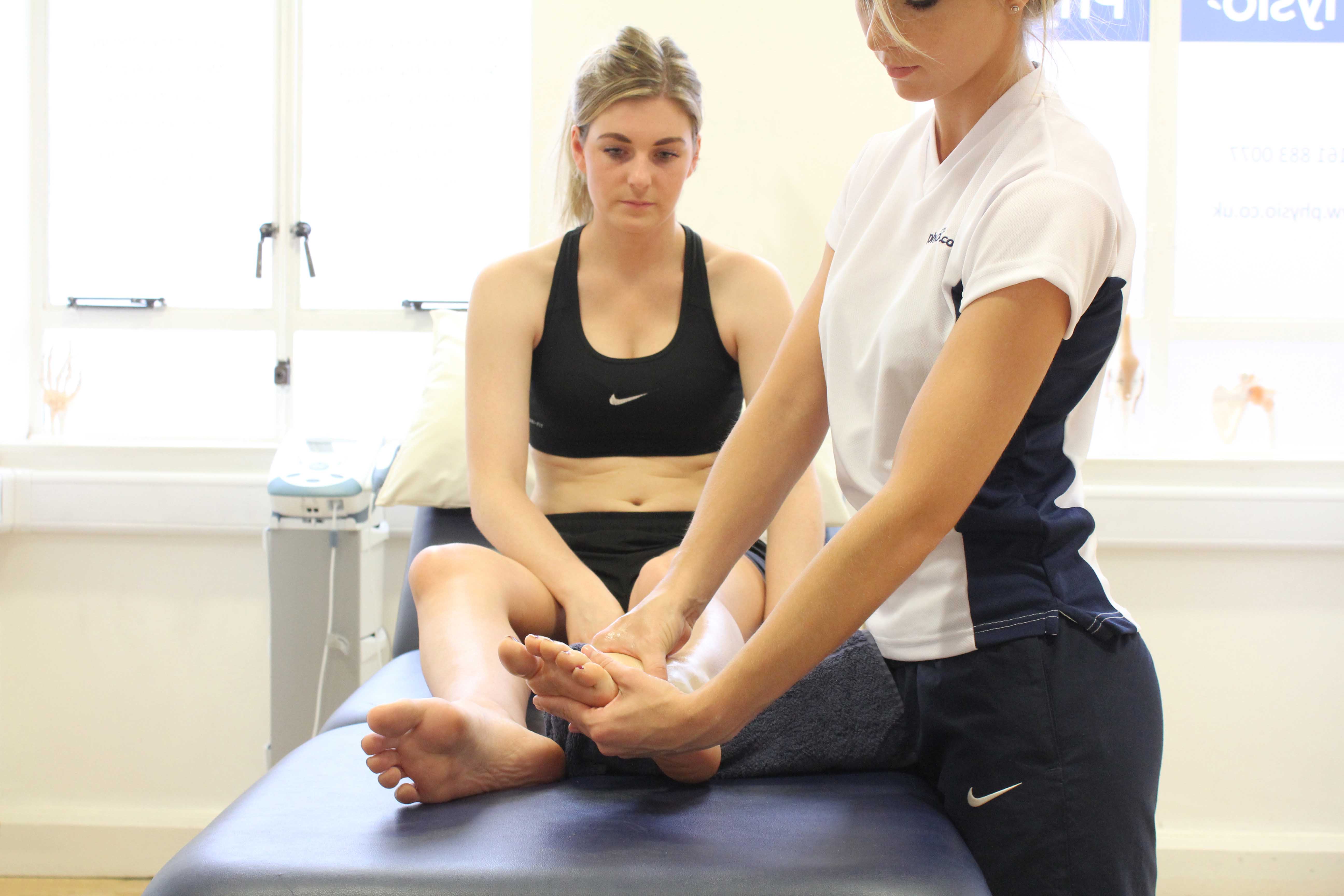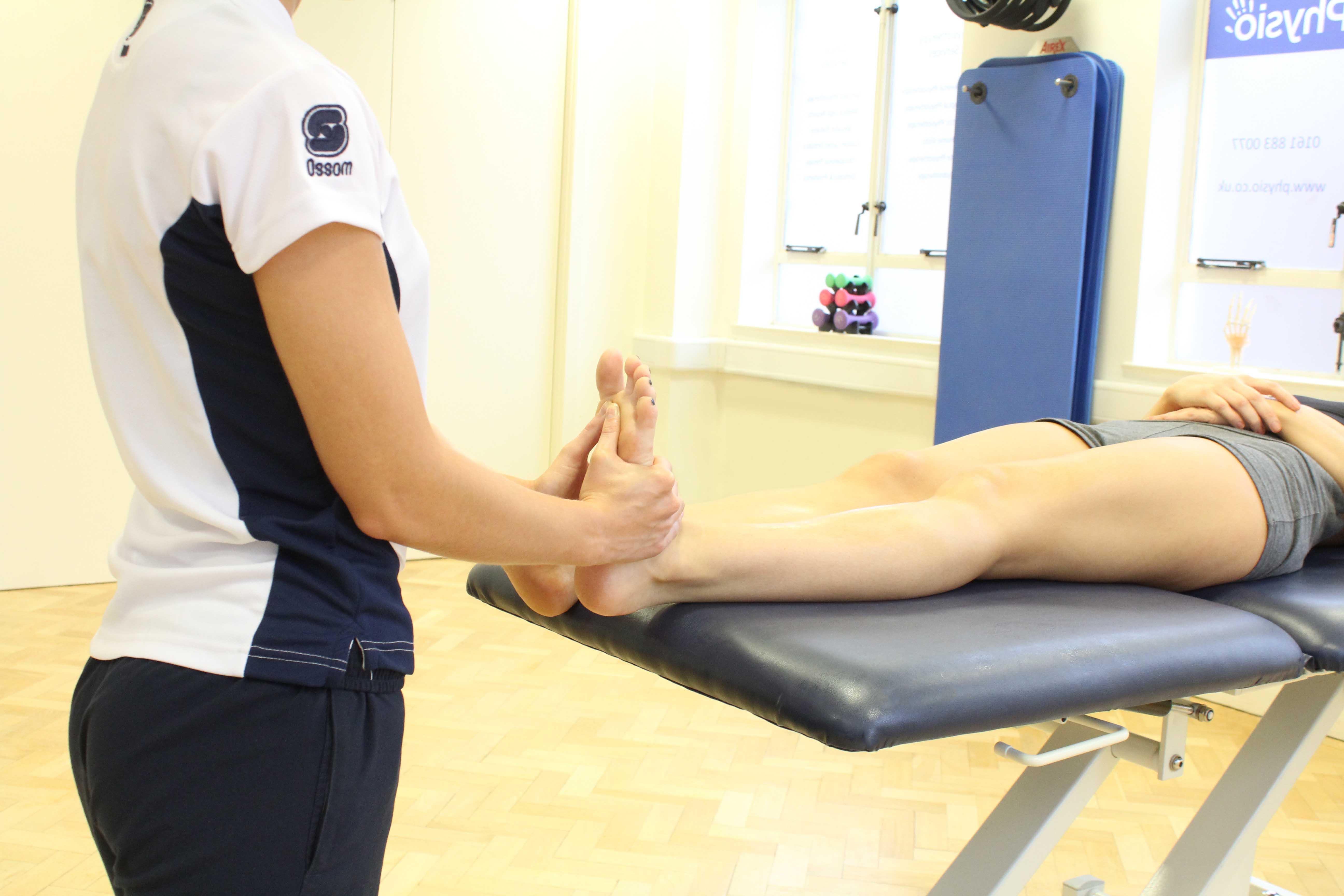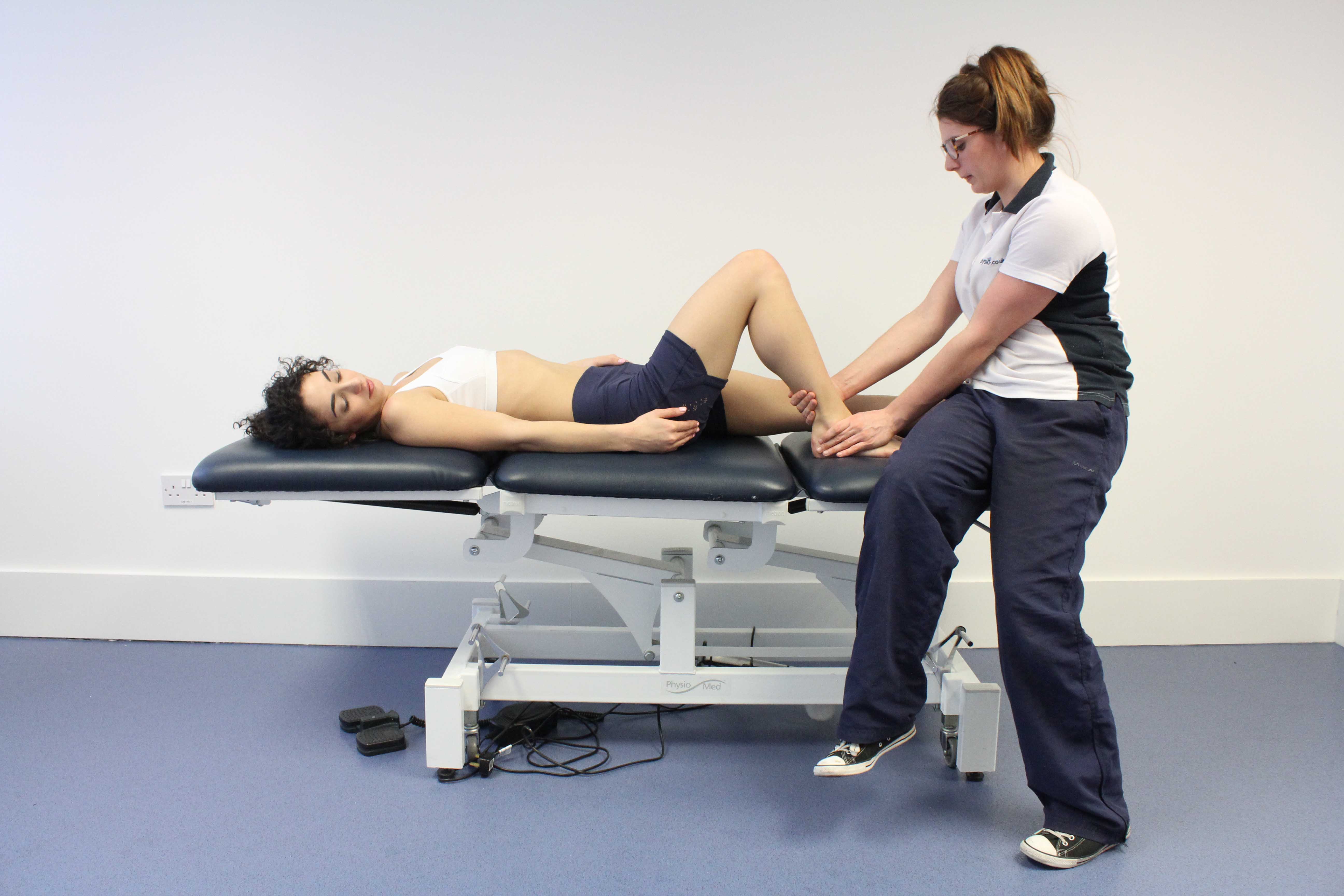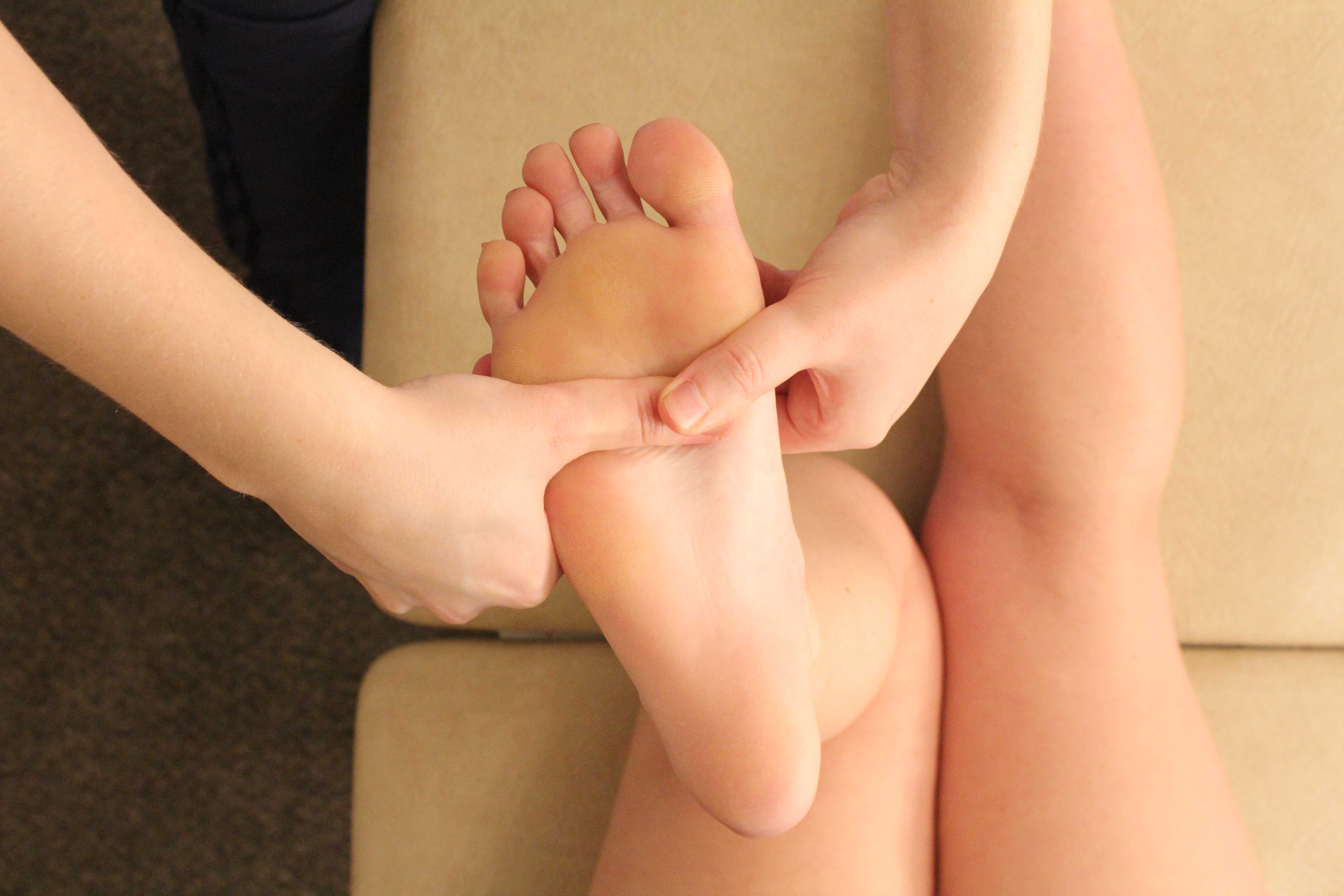Bunion Surgery
At Physio.co.uk our team of specialist musculoskeletal physiotherapists are experts in post-surgical rehabilitation. We aim to offer you a complete holistic treatment package designed in conjunction with you to help reduce pain and maximise functional recovery. Below is a detailed description of Bunion surgery and how we can help you with your recovery.
What is a Bunion?
A bunion (also known as hallux valgus) is a deformity found at the base of the big toe where it joins with the foot. Bunions cause pain around the joint which can increase whilst walking. The deformity can also make it hard to find shoes which fit. Bunions are more common in women than men and it is thought that poor fitting footwear is the main cause. However it is thought that genetic factors can also predispose a person to bunion formation.
 Above: Mobilisations and stretches applied to the connective tissues of the foot
Above: Mobilisations and stretches applied to the connective tissues of the footHow does a bunion form?
Normally the big toe sits in a naturally straight position. In some circumstances over time the big toe can starts to angle itself towards the middle of the foot and other toes. This causes the bones in the big toe and the foot deviate out towards the edge of the foot. The misalignment of the bones results in new bony growth and inflammation. The new growth and inflammation if left untreated will eventually produce the deformity which we call bunions.
Joints and bones involved
During your appointments with your consultant you may hear many complicated sounding words which refer to the specific joints and bones in the foot affected by bunions. The joint between your big toe and foot is known as the first metatarsophalangeal joint (first MTP joint). The two bones which meet at the joint are called the first metatarsal (the bone in the forefoot) and the first proximal phalange (first bone in the big toe).
 Above: Accupressure massage of the planta fascia under the foot
Above: Accupressure massage of the planta fascia under the footWho requires bunion surgery?
Bunion surgery may be considered when symptoms become sever and do not respond to non-surgical treatment. There are different types of surgery available and the choice available to you will depend on the level of deformity, associated symptoms, age and other medical conditions.
We have already discussed that poorly fitting shoes and genetics can predispose people to bunion. There are however some common medical conditions where bunions are more likely to form including:
- Arthritis
- Cerebral palsy
- Charcot Marie Tooth Disease
- Multiple Sclerosis
- Marfans Syndrome
- Downs Syndrome
 Above: mobilisations and stretches of the foot and ankle
Above: mobilisations and stretches of the foot and ankleHow can physiotherapy help after bunion surgery?
Following any surgery physiotherapy is concerned with restoring normal physical function. This is completed through a number of therapeutic treatments which include pain management, manual therapies, exercise therapy, electrotherapy and hydrotherapy. The aim is to help return the client back to their functional level prior to surgery. In some cases this is a relatively simple task and in others this can be a long process which takes time and effort. Listed below are some of the major rehabilitation treatments we offer here at Physio.co.uk.
 Above: Trigger point massage of the planta fascia under the foot
Above: Trigger point massage of the planta fascia under the footPain Management
Pain can be a major issue following any surgery. At Physio.co.uk our specialist physiotherapists have a great deal of experience in dealing with people with pain issues and are equipped to help. We are able to offer a number of treatments which are designed to directly target and help reduce pain. Listed below are some of the main physiotherapy options for pain management:
- Acupuncture
- Education of Condition
- Hydrotherapy
- Managing Flare-ups
- Normalising Sensation
- Relaxation Exercises
- TENS
Manual Therapies
Manual therapies are a hands on approach to physiotherapy which are specifically designed to produce a number of therapeutic effects. They can help speed up the healing process, reduce pain, maximise scar tissue formation and help with relaxation. Below is a list of the manual therapies we offer at Physio.co.uk:
- Manipulation/Mobilisation
- Massage
- Soft Tissue Treatment
Exercise Therapy
Exercise therapy is an integral part of the rehabilitation process and is designed improve your strength and flexibility. Your physiotherapist will work closely with you to produce an exercise programme which works on improving the muscles of your foot and leg but may well consider working other core muscles to help realign posture. Below is a list of some of the types of exercise therapy we can offer:
- Balance Exercises
- Core Stability Exercises
- Exercise Programmes
- Post-Surgical Rehabilitation
- Proprioceptive Exercises
- Range of Movement Exercises
- Strengthening Exercises
- Stretching Programmes
Electrotherapy
Electrotherapy makes use of different types of energy waves to produce therapeutic effects. It can be used for pain relief, speed up tissue repair and reduce swelling among many others. There are many types of electrotherapy available and your physiotherapist will select the modality most suited to your needs. Below is a list of some the electrotherapy modalities available at Physio.co.uk:
- EMS
- Interferential
- Laser
- LIPUS
- PSWD
- TENS
- Ultrasound
Hydrotherapy
Hydrotherapy utilises the therapeutic effects of water to help with rehabilitation. In the pool your physiotherapist will use the natural buoyancy of water as a support reducing the stress of certain exercises allowing you to progress to exercises which you may not have been able to manage on dry land. Hydrotherapy can play a major role in post-operative rehabilitation.
Bookings
To book an appointment with one of our specialist physiotherapists or find out more information how Physio.co.uk could help you please contact us today on 0330 088 7800 or email office@physio.co.uk

 0330 088 7800
0330 088 7800





































